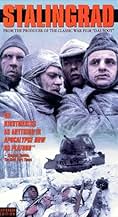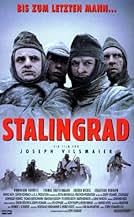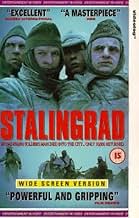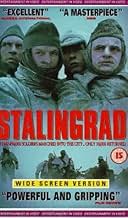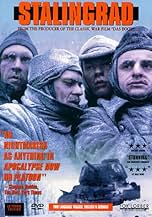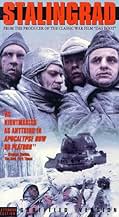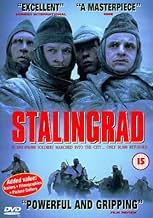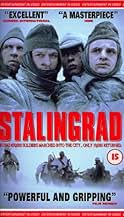L'histoire suit un groupe de soldats allemands, de leur R&R italien à l'été 1942 aux steppes gelées de la Russie soviétique et se terminant par la bataille pour Stalingrad.L'histoire suit un groupe de soldats allemands, de leur R&R italien à l'été 1942 aux steppes gelées de la Russie soviétique et se terminant par la bataille pour Stalingrad.L'histoire suit un groupe de soldats allemands, de leur R&R italien à l'été 1942 aux steppes gelées de la Russie soviétique et se terminant par la bataille pour Stalingrad.
- Prix
- 3 victoires et 1 nomination au total
- Pfarrer Renner
- (as Eckhardt A. Wachholz)
Avis en vedette
These men are trapped like rats, and survival at any cost, to preserve ones life is paramount. Politics and lofty notions fly out the window, as the veneer of civilized behavior is stripped off.
STALINGRAD is gripping, grotesque, poignant and pitiful in its graphic presentation of war time experience. Highly recommended.
The combat scenes themselves are even more horrific. In one scene a German soldier hits a Russian over the head with a shovel as the Russian is trying to kill Ltn. von Witzland. In another scene a German soldier is cut in half by a Russian tank shell. There are many other gruesome scenes in the film, but they are necessary. The world has to see what happened in the Battle of Stalingrad. To see its brutality. To have its heart broken at the horrendous waste of the soldiers' lives. Over 2 million people lost there lives. Only 6000 of Field Marshal Paulus' 250,000-man 6th Army survived the battle. As with the battle, the film itself does not have a happy ending. And that's the way it should be. And as you watch this film, remember one thing, not every German soldier who fought in the war was a criminal. They were mostly decent people caught up in events well beyond their control.
The film revolves around four soldiers fighting in Stalingrad. They were transferred there to try and take the city. The film follows these men from August of 1942 to early 1943. During this time, they learn about the horrors of war and try to find a way out of the battle.
Through the entire film, one feels the desperation of the entire battle. Unlike "Enemy at the Gates" the film makers didn't try to put some sappy love story or dress up factual occurrences of the battle. This film may be fiction, but it conveys what happened in the bloodiest battle in World War II.
Le saviez-vous
- AnecdotesChristoph Fromm wrote the original screenplay. The producers disagreed with his more realistic direction. They had it rewritten, and Fromm took his name off the film.
- GaffesTowards the end of film a Ju52 drops a single supply parachute. When dropped out of the plane and falling towards ground, it is green, when they recover it on the ground it is white. (In reality the Luftwaffe was first using white parachutes until they realized it is too difficult to spot white parachutes on the snowy ground.)
- Citations
Lt. Hans von Witzland: The best thing about the cold is...
[Witzland dies]
Fritz Reiser: [holding the body, he laughs] You don't have to worry about sunburn. Ever been to the desert? You'd hate it. It's so hot, you're always sweating. You think you're melting, like butter. The desert is shit. Except for the stars. They're so close, you know?
[dies]
- ConnexionsFeatured in The 100 Greatest War Films (2005)
Meilleurs choix
Détails
- Date de sortie
- Pays d’origine
- Langues
- Aussi connu sous le nom de
- Trận Chiến Stalingrad
- Lieux de tournage
- sociétés de production
- Consultez plus de crédits d'entreprise sur IMDbPro
Box-office
- Budget
- 20 000 000 DEM (estimation)
- Brut – États-Unis et Canada
- 152 972 $ US
- Fin de semaine d'ouverture – États-Unis et Canada
- 10 882 $ US
- 29 mai 1995
- Brut – à l'échelle mondiale
- 152 972 $ US
- Durée2 heures 14 minutes
- Mixage
- Rapport de forme
- 1.85 : 1
Contribuer à cette page


